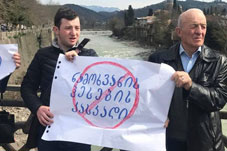
NGOs respond to rally dispersal against Namakhvani HPP by using police force
By Khatia Bzhalava
Tuesday, November 17
Non-governmental organizations - Georgian Young Lawyers’ Association (GYLA), Green Alternative and Human Rights Education and Monitoring Center – EMC respond to the dispersal of protest against the construction of Namakhvani HPP by using police force on November 14. According to the NGOs, instead of conducting dialogues with the locals, who are concerned with the HPP’s high environmental impact, the government ignores the community’s interests and uses police force and repressive methods to suppress the protest. The organizations urge the government to stop using repressive methods against peaceful protesters and to provide suspension of construction works until they present proper documentation and research on the potential impact of HPP.
According to the statement published by the organizations, as of November 15, residents of village Zhoneti were protesting the construction of the Namakhvani HPP cascade for 21 days. They still demand halting of the building process, which is underway with a status of preparatory works. As the NGOs note, the so-called preparatory works involve considerable intervention and significantly convert local natural and social environments. However, substantial documentation and expert studies about the impact of HPP under construction is yet to be submitted. The local people demand an opportunity to meet with the relevant authority officials and share their concerns, but as the statement reads, instead of starting dialogues, up to 100 police officers were mobilized at the rally, and protesters, including elderly, women and children, were forcibly removed from the road. According to the locals, some of the activists were injured in a clash with the police.
The project of Namakhvani HPP is being carried out in the valley of river Rioni by the Turkish company ENKA. NGOs note that a tunnel of Shuakhevi HPP, which had been built by the same company, demolished soon after commissioning.
Constructing the Namakhvani HPP cascade is planned in Tskaltubo and Tsageri municipalities. The statement reads that the Namakhvani HPP cascade is one of the largest energy projects with an installed capacity of 433 MW. The Namakhvani HPP Cascade Project encompasses the building of two separate HPPs on the Rioni River, therefore “due to its massive scale, the potential impact and possible risks on the local social and natural environment are high.”
As the NGOs state, based on the Environmental Impact Assessment Report prepared by the company (ENKA Renewables), the implementation of the lower Namakhvani project alone will be associated with the loss of a significant amount of land, which is mainly caused due to the arrangement of a reservoir with a 610hectare mirror surface. There are also high risks existing in the context of physical and economic resettlement, in particular, if the power plant is built, 100 families will be subject to dispossession as their settlement will be under a risk of inundation. The statement reads that the project is accompanied by serious seismic risks as well. As experts say, cascades of Namakhvani and Tvishi dams will not withstand a 5 magnitude earthquake, whilst there was a 7 magnitude earthquake in Racha in 1991.
According to the statement, the construction permit issued by LEPL Technical and Construction Supervision Agency (TCSA) of the Ministry of Economy and Sustainable Development of Georgia provides some documentation that should be submitted by the company before the construction starts. Respectively, the NGOs state that at this stage, the company is carrying out the construction without having submitted substantial documentation and research required by the construction permit.
The statement reads that against the background when the local population, the community, and specialists in the field have several critical conclusions and questions regarding the legality of the construction of HPP, as well as its severely high impact and risks, the large-scale construction is ‘proceeding smoothly’ with the lack of transparency and ignorance to the critical questions and opinions.
“In response to the local community’s concerns and peaceful protest, the government uses repressive methods and tries to suppress the local’s protest by using police force, grossly violating the fundamental rights of the people under the influence of the project,” reads the statement.
Considering the above mentioned, the NGOs call on the government of Georgia to:
•Stop using repressive methods against the fair and peaceful protest of the local community and immediately create a format of real and continuous dialogue with the community and the specialists in the field.
•Ensure a halt to construction of Namakhvani HPP until adequate consultations are conducted with the community and prior to submitting documents and researches by the company on the potential impact of the HPP
NGOs call on the court to:
•Ensure timely and impartial review of the submitted complaint to enable the locals to resolve their problems through legal means.
The NGOs call on local and international organisations, diplomatic missions and media organisations to:
•Become actively interested in the legality of Namakhvani HPP construction and its possible impact.
•Use all available resources to support the worries of local people and put the problems of Namakhvani plat construction on the agenda.


